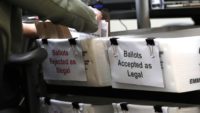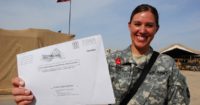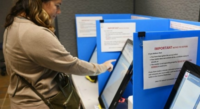Vote Fraud
Vote fraud disenfranchises Americans and poses a serious threat to both the integrity of and confidence in our electoral system. Opponents of measures to prevent vote fraud contend that its occurrence is either nonexistent or so rare as to be insignificant.
Vote fraud is insidious, committed quietly. And once it’s committed, it cannot be undone. Vote fraud contaminates the pool of votes, and if sufficiently extensive, will affect the outcome of an election. As elections determine who exercises political power, there is a motivation among some bad actors to cheat.
Vote fraud is rarely prosecuted for two main reasons. First, it is virtually impossible to identify the fraud before the damage is done as it is primarily committed through absentee and mail-in balloting; second, prosecuting the crime is expensive and is usually a low priority of prosecutors and local law enforcement more concerned with public safety. However, vote fraud is a crime that strikes at the center of our republic.
The principal weakness in our electoral system that fosters vote fraud is inaccurate voter registration rolls. The federal requirement that counties maintain clean, accurate voter rolls has been ignored over the years and actively resisted under the Obama Department of Justice.
Voter rolls should contain only the names of eligible residents of a jurisdiction, but in far too many counties, voter rolls bulge with the names of the dead, those who have moved away, non-citizens, fictional names and voters registered in more than one place.
A Pew Center on the States study in 2012 revealed that:
- Approximately 24 million—one of every eight—voter registrations in the United States were no longer valid or were significantly inaccurate.
- More than 1.8 million deceased individuals were listed as voters.
- Approximately 2.75 million people had registrations in more than one state.
In nearly 200 counties around the nation, more people are registered to vote than the counties’ population of eligible citizens. Examples abound of non-citizens and convicted felons registered to vote. In Philadelphia, an ACRU lawsuit in 2016 revealed thousands of ineligible people on the voter rolls. A sampling of counties in Virginia also found hundreds of illegal registrations, according to a 2016 study by the Public Interest Legal Foundation.
In-person vote fraud, while far more rare than absentee voting, does happen, as shown by the video sting operations of Project Veritas, in which an impersonator at a polling place in the District of Columbia claimed to be then-Attorney General Eric H. Holder, Jr. and easily obtained a ballot. In other Project Veritas videos political operatives openly discussed how to commit vote fraud in Wisconsin and other states.
The institutional Left has focused on preventing common-sense laws to require voters to prove they are who they claim they are, making the ridiculous and unprovable claim that photo ID laws discriminate against racial minorities and the poor. But, vote fraud is accommodated by other means such as extended voting periods and relaxed standards for acquiring absentee or mail-in ballots and not requiring proof of citizenship when registering to vote.
Several reasonable actions should be adopted to guard against vote fraud:
- enforce federal voter roll maintenance laws;
- require photo ID to vote in person;
- require voter ID and signature verification for absentee ballots;
- limit early voting to no more than a week prior to an election;
- require proof of U.S. citizenship;
- encourage more states to participate in cooperative efforts to identify voters registered in more than one state.
Voting is a privilege of citizenship and only legal votes should be counted. The only way to stop vote fraud is to prevent it!
ACRU Commentary
ACRUs Blackwell: Liberal voting changes put senior votes at significant risk
Nursing homes and assisted living centers where seniors might need to rely on others for voting assistance are where senior votes are at high risk for fraud, according to ACRU Action Board Member and former Cincinnati Mayor Ken Blackwell. Not only have they been targeted by fraudsters in the past, but politically motivated liberals are now trying to remove even more vote security protections.
ACRUs Blackwell: Liberal voting changes put senior votes at significant risk
Nursing homes and assisted living centers where seniors might need to rely on others for voting assistance are where senior votes are at high risk for fraud, according to ACRU Action Board Member and former Cincinnati Mayor Ken Blackwell. Not only have they been targeted by fraudsters in the past, but politically motivated liberals are now trying to remove even more vote security protections.
Encouraging and protecting military votes is a civilian imperative
It is the responsibility of all Americans to ensure the votes of Armed Forces members away from home arrive on time and are properly counted. The time is NOW for service members to register to vote and request an absentee ballot. Registration links are included in the article.
ACRU Action’s Blackwell notes liberal bad behavior creates vote security risk
"The left and their chosen candidates have provided telling examples of their unwillingness to make ethical choices that protect citizens. Proving themselves willing to violate numerous critical social norms, they are unlikely to be concerned with violating just one more," states Blackwell.
Pennsylvania mail ballot problems kept tens of thousands from voting in primary election
To make sure your vote counts, vote in person. Wear your mask, stay six feet behind your neighbors, wash your hands when you’re done, and don’t mail your ballot. With evidence coming in from mail-in ballot fails from several states, USPS admits it cannot handle the load. Because of postal drag, at least 92,000 votes in Pennsylvania’s recent primary were not counted. Don’t let that be you in November.
Election Department Employee Alerts Clerk Tina Peters to Voter Fraud Leading to Arrest
A key ACRU vote integrity message is calling for election officials to be on alert for fraud. Case in point, a Colorado official who noticed a deceased gentlemen reinstated “his” voter registration. Kudos to election coordinator Sandra Brown, whose eagle eye resulted in vote fraud charges against one Larry Talbert. Other officials take note - databases already exist for cross checking - you just have to use them.
News
Giving in vs. standing up for vote integrity may divide candidates in future elections
Minnesota GOP Congressman-elect Michelle Fischbach and incumbent Rep. Tom Emmer have both called for a full investigation of vote fraud allegations in the state, particularly in Minneapolis where Project Veritas proved fraud was taking place even before November 3. Other members of the MN GOP caucus capitulated to a Democrat White House almost immediately. It is likely that Republican voters in the state will remember who was courageous and who was not.
Army spouse: the practical realities of overseas military voting must be simplified
Military voting is of critical importance to Armed Forces command. But like any bureaucracy, execution can be overly cumbersome and confusing. Army spouse Tracey Miller examines the complexities of military voting (from personal experience) noting that instructions like, “fold this piece of paper and make it into an envelope” are confusing and serve as a barrier to military voting. Our service members shouldn’t have to haul around scissors, tape and extra paper in election years.
Military votes could be key in Georgia’s January 5th Senate runoffs
The United States Senate, and perhaps our very Constitutional liberties, depends on the outcome of the Georgia Senate elections — unique in that the state’s two Senate seats are in play at the same time. The Georgia Secretary of State is currently sending out absentee ballots to Georgia residents posted in the military overseas, or at other US bases. We encourage all Georgian members of the Armed Forces to complete and return their absentee ballots as soon as they are received.
ACRU: Vote Fraud in Nursing Homes is Real and Verifiable
American Constitutional Rights Union (ACRU) has provided affidavits to the Texas Attorney General as part of a request for a criminal investigation into alleged vote fraud committed against a resident with dementia in a Texas nursing home.
No, Electronic Vote Fraud Is Not A Conspiracy Theory
Since the election, there have been a lot of electrons expended on the internet debating whether interference with electronic voting machines is possible.
Social Worker Charged with 134 Felony Counts of Election Fraud
A Texas woman has been charged with 134 counts of election fraud after she allegedly acted to register nursing home residents, many of whom were mentally incapacitated, to vote in the 2020 election.












